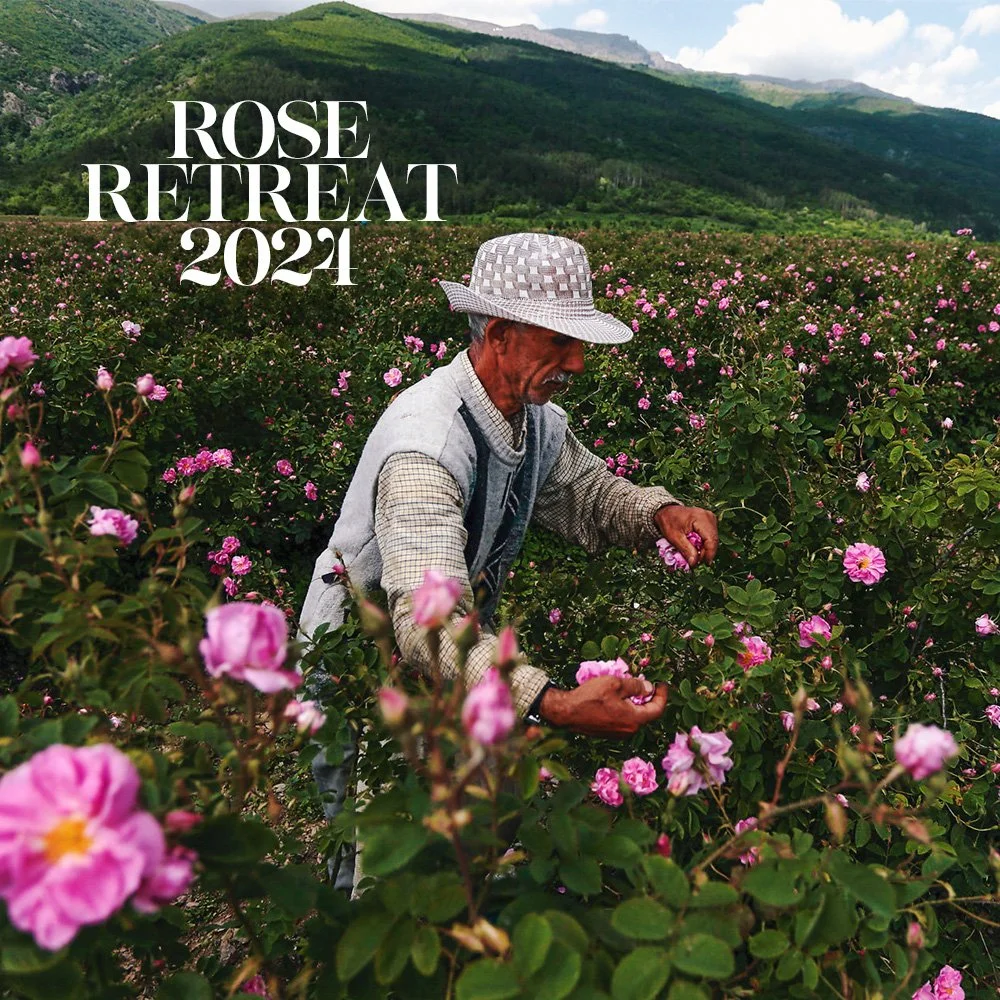From Roses to Cosmos with Marina Barcenilla
10 Questions to Marina Barcenilla
We talk about roses, perfumes, and the scent of a rose in space…
Spanish-born, UK-based perfumer Marina Barcenilla, award-winning creator, educator, and holder of the Rosa Damascena Chair at the Spanish Perfume Academy, who also happened to be our guest perfumer for Rose Retreat 2024, is “talking roses” with us. For her, scent has always been an invisible language of memory and imagination. Step with us into her fragrant thoughts!
Q1: It’s difficult not to notice that you hold the Rosa Damascena Chair at the Spanish Perfume Academy. What drew you to the world of perfumery, and how did your passion for roses come about?
I was never that interested in perfumes. Since childhood, however, I have been obsessed with smells, whether good or bad. To me, smells were a puzzle that I had to solve. They told me so much, and they made me feel so, so much! However, things without smell didn’t make a lot of sense to me, so I started making up smells in my head for things that didn’t have one and ended up creating perfumes.
As for my passion for roses, it comes in part from the many different rose smells that I remember from childhood, the feel of their petals when I rubbed them between my fingers, how they tickled my nose when I got close so I could smell them better, the little green insects that lived in and on the roses, and the respect they instilled in me because of their thorns. Add to that the precious memories that will forever link the smell of roses to my maternal grandmother, and you end up with my passion for the queen of flowers.
Q2: Rose is a classical perfume ingredient, a symbol of beauty and romance. Do you have a favourite perfume with rose?
It’s probably not the answer most people will expect, but I’m not a fan of rose soliflores. I like my roses pure, without a lot else going on. However, if I had to choose a perfume with a prominent rose note, I’d say Joy by Jean Patou, ideally a vintage version.
Q3: As a self-taught perfumer, what challenges did you encounter while mastering the art of fragrance creation?
Where do I begin? There were so many! The main one was the lack of information. Things were very different three decades ago when I started learning in the mid-90s. There was no internet, so no Google to search for answers, no forums, no blog posts, no websites selling perfumery materials where you could read about them, and no books on perfumery that I could use as a guide. I had to teach myself everything without any of the information that people have at their fingertips today, using only aromatherapy books that don’t teach perfumery and any historical reference books and texts I could find. I didn’t know anything about chemistry either, so my nose did most of the work. The inability to source good-quality materials in small quantities was also a big challenge, as was the lack of feedback from an experienced nose that could offer guidance. It was a lonely journey, which is why I decided to teach and mentor students and eventually founded my own perfumery school.
Q4: Each perfume tells a story. In your opinion, what narrative or atmosphere does a rose-centred fragrance convey? Is there anything special about the essence of roses?
Many people would answer love and romance, but not for me. One of the unique things about roses is that they can be interpreted in myriad ways to create many different narratives or atmospheres, which is why I decided that we would create a space rose fragrance for your retreat this year!
The Rose Valley, Bulgaria, 2024
Q5: Roses have been used in perfumery for centuries, making them an integral part of fragrance history. How do you strike a balance between honouring tradition and pushing the boundaries of innovation and contemporary techniques in your rose-inclusive/rose-centred creations?
By not trying to do both things at once. If I want to honour tradition, I use rose in a classical way, either as a soliflore, as part of a floral bouquet, or in a classic Chypre. If I want to do something different, I’ll create a contrast between the rose and notes that may seem to clash with it or fight for attention, and transform the rose into something different. And then, there are all the other perfumes in which I don’t want the rose to shine, but where it’s essential because it completes the fragrance or exalts other notes in ways no other ingredient can.
Q6: I am a huge fan of your scientific projects and especially your work with AromAtom on the topic of how space smells. Based on your experience and knowledge, how do you think a Rose in Space would smell?
If I’m being realistic, I’d say that we wouldn’t be able to smell it because we simply couldn’t breathe, but that its smell would depend on the part of space or the planet where we found ourselves, as the chemical composition surrounding us would affect the volatile molecules exuded by the rose, as well as the smell we perceived. However, if I use my imagination while still being a little bit realistic, I’d say muted, less floral than on Earth, dry and slightly metallic and smoky.
Q7: The sense of smell is closely linked to memory and emotions. What’s your most precious memory related to a scent or a perfume?
I have two: the scent of rose and the memory of my grandmother, and the scent of patchouli and the memory of my mum.
Q8: The world of perfumery is constantly evolving, with new trends and customer preferences emerging. How do you stay inspired and adapt to these changes while remaining true to your love for fragrance and maintaining your signature style?
I don’t follow trends or create according to customer preferences. Perfume is my creative expression; it’s about how I see and feel the world around me, including my personal memories, the people I know, my travels, my joys and sorrows, and the work I do as a space scientist. That’s why I don’t launch new perfumes every year; I only launch new perfumes when I’ve finished giving olfactory form to something important to me, and only if I want to share it.
Q9: You are the guest perfumer for Rose Retreat 2024. What are your expectations about this experience in the Bulgarian Rose Valley?
I’ve been dreaming of a trip to the Bulgarian Rose Valley for decades, so I’m looking forward to creating lots of new fragrant memories, getting a chance to meet the people behind the scenes who are so crucial to the world of perfumery, and hoping to learn as much as possible about my favourite flower while sharing what I know with the other participants.
Q10: Did you enjoy working with the Bulgarian perfume materials I brought you earlier in March? Do you have a favourite?
Yes, they were all fabulous, and while it might be a cliché, the rose essential oil was my favourite.


